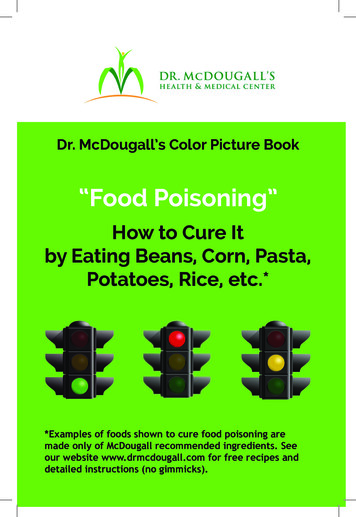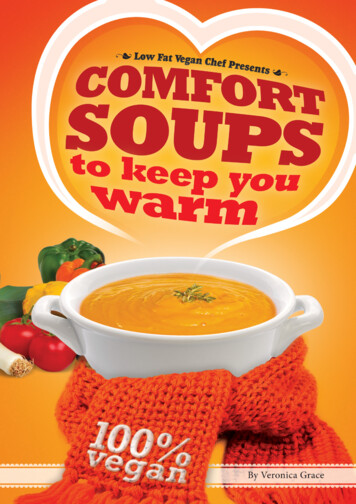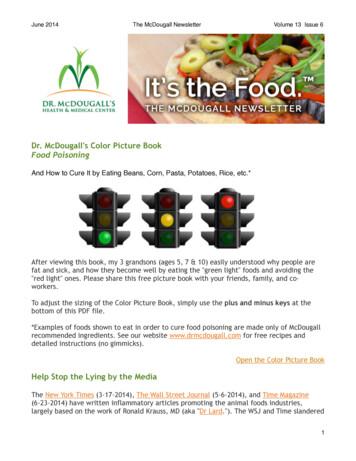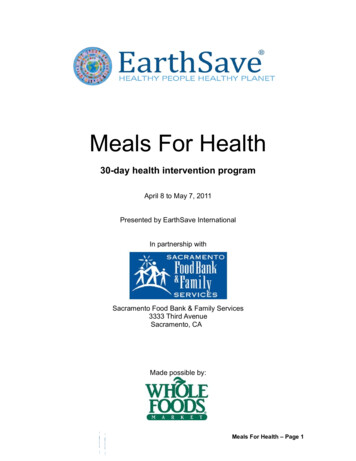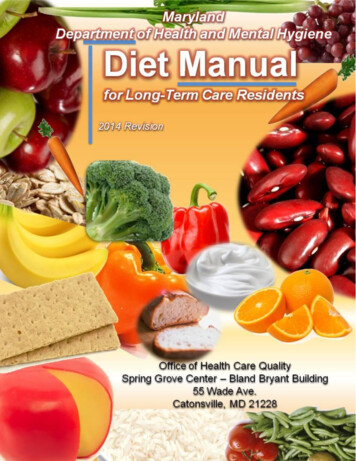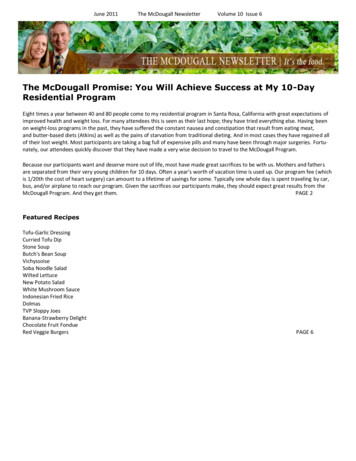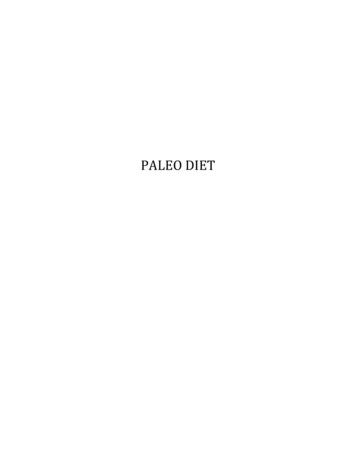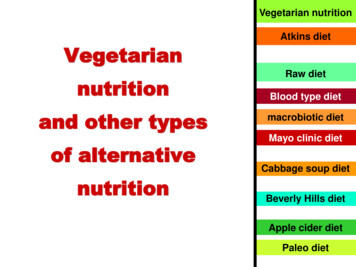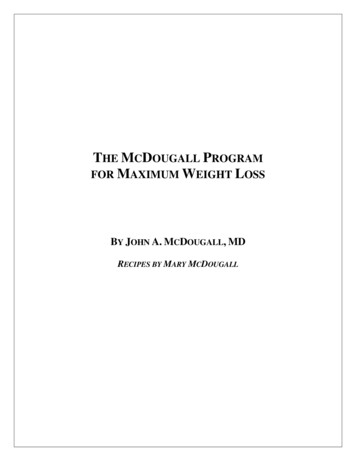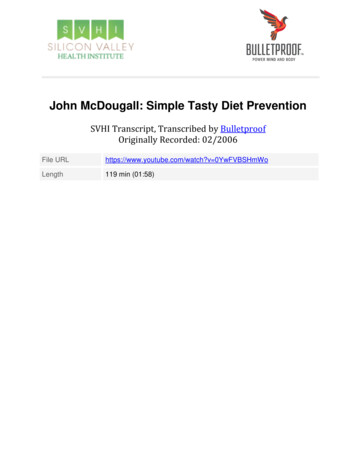
Transcription
John McDougall: Simple Tasty Diet PreventionSVHI Transcript, Transcribed by BulletproofOriginally Recorded: 02/2006File URLhttps://www.youtube.com/watch?v 0YwFVBSHmWoLength119 min (01:58)
Speaker 1:Speaker tonight. I want to thank him for that. John McDougall has been studying,writing and speaking out about the effects of nutrition on disease for over 20years. He believes that people should look and feel great and enjoy optimalhealth which is something I we talk about a lot here at Smart Life Form, for alifetime. Unfortunately, people compromise their health unknowingly to poordietary health. Dr. McDougall is the founder and medical director of the nationaland renowned McDougall Program, a ten day residential program located at aluxury resort at Santa Rosa in California, a place where medical miracles occurthrough proper diet and lifestyle changes.Dr. McDougall has cared for thousands of patients over three decades, almostthree decades with of medical practice and he's run a highly successful live-inprogram for more than 17 years. He's developed a nourishing, low fat, starchbased diet that not only promotes a broad range of dramatic and lasting healthbenefits such as weigh loss, fat loss but most importantly, it can reverse seriousillnesses like heart disease without drugs. As with many leaders of public opinion,he often finds it necessary to challenge the accepted wisdom of the time and hewas one of the first traditional physicians of the medical 'establishment' to assertthat the exact the adoption of a vegetarian diet can reverse unfavorable medicalconditions such as heart disease.Medical research is now confirming this assertion and slowly but surely medicalpractitioners are settling in. Dr. McDougall is the author of several nationalbestsellers including Mcdougall's Plan to 12 days to Dynamic Health, Mcdougall'smedicine, A Challenging Second Opinion, Mcdougall's program for MaximumWeight Loss, The New Mcdougall Cookbook, The Mcdougall Program for Womenand his latest groundbreaking book, The Mcdougall's Program for Health andHeart. A graduate of Michigan State University's college of Human Medicine, hetook [inaudible 00:02:35] internship at Queen's Medical Center in HonoluluHawaii and his medical residency at the University of Hawaii.He is certified as an Internist by the Board of Internal Medicine and the NationalBoard of Medical Examiners. To make it easier for people to eat well on the go,Dr. McDougall co-founded Dr. Mcdougall's Right Foods Incorporated, a producerof high quality vegetarian cuisine. The convenience meals are consistent with hishealth supporting guidelines of 10% or less calories from fat, strictly vegetarianswhere there is no cholesterol and no added oils. Dr. Mcdougall is generalincumbent and I would also like to mention that he is accompanied by his wifeand partner, Mary, who is here tonight. It's with great pleasure that I introducetonight's guest speaker, Dr. John McDougall.Dr. John:Thank you for the invitation. I noticed all of you have a lot of opinions. I do too, Ihave very strong opinions and you can make it fun for me if you challenge mealong the way, I miss that a lot. I talk and I get a very little feedback. I'm going totell you how I feel about things and I've been at this for a little longer than 20years, probably closer to 30. I like doing what I do because the results that I getas a doctor, that's really the fun in life, it's helping other people. I'll explain to(02-2006) John McDougall: Simple Tasty Diet PreventionPage 2 of 37
you why I don't practice medicine like I was trained and why I practice like I doand I'm going to make a lot of qualifications, I hope I remember to do that alongthe way, to make qualifications, so that I don't over speak the situation.Sometimes I get so enthused about what I do, that I generalize and it's a[inaudible 00:04:40] that a lot of people have, but I try to stop along the way andtell you that I am realistic and do realize for example, this first slide up here sayssomething about the limitations of modern medicine.It does have some serious limitations but it also has some serious benefits. Forexample, if I get in an auto accident, I don't want you to come up to me with abaked potato and a carrot and say this is your treatment tonight. I fully realizethat modern medicine has some wonderful things to offer when it comes toinfections and traumas and other things so if I make some glowing statementstonight about the failing of modern medicine, realize that that I understandthere's some very, very wonderful things. I also feel strongly about the benefitsof self-care. I think more and more people are coming to that realization, is thatit really is how we take care of ourselves that makes a difference in terms of theoutcome. I'll try and share that with you. When Bill asked me to talk to thisgroup, I wasn't really quite sure what I should talk to about.My first inclination I was going to give you talk about dairy products which is onthe DVD. I had there some other several different thoughts about what I shouldtalk to you about. Instead what I thought I would do is put together kind of ageneralization of what I do so you can get sort of the tone. Something I wouldlike to sit back there and say, "I'd rather be talked to in terms of scientificreferences, in terms of data, in terms of hard science." I go hard science with theall day long. my passion is scientific literature so if you want to take a step onthat track I'll be glad to go with you, it's no problem at all. Instead what I'd like todo is, I'd like to give you just a feel of what I do. Some generalizations of how Ibelieve and the kind of practice that I have. I consider myself the luckiest doctorin the world because of how my patients do.The situation is really sad out there in the United States of America. It's asituation where annually in this country, we have 1.2 million heart attacks,700,000 strokes. Most Americans are sick. It's an exception to find a healthyperson. Most Americans over the age of 35, almost all of them with fewexceptions, have a risk factor that says that they're going to die prematurely of aheart attack, stroke, cancer, complications of diabetes and so on. Where you livein a country where a third of the people have elevated cholesterol by today'sstandards. Today's standards are really I think excessive. If you use the standardsthat I use, you'd probably have to be up around 98% on blood elevatedcholesterol.Most are inactive, a third have high blood pressure, again by today's standards.More than 30% are obese and they tell us that 65% of people and you don't haveto go any further than the next shopping center to confirm this, you don't need ascientific study, 65% of people are too fat for their own good. 10% of people are(02-2006) John McDougall: Simple Tasty Diet PreventionPage 3 of 37
diabetic. We live in a nation where almost everybody is sick. How do you explainthat? It's a rarity to find a healthy person, how do you explain that? Probably thechlorine in the water. Almost everybody is sick in this country and so we have totake a broad sweep at the possibilities. Is a genetic problem? Is it acontamination as was mentioned by our last speaker? Is it maybe a massive viralinfection that nobody's discovered? What's the problem.Let me talk to you about the treatment of my patients and one of the problems Ihave with the medical system. This is one of my patients. He has a diagnosis, andI'm not exaggerating, most of the people that I take care of at the clinic come inwith a series of problems, not just one problem, but a series of problems. Hecomes in with a high blood pressure, type 2 diabetes, elevated cholesterol,elevated triglycerides, he has gout, his kidneys are already failing, he'soverweight, mild osteoarthritis, constipated and depressed. You think this is anexaggeration? How many of you are doctors here, how many of you see peoplelike this all day long?This is the typical person. I met him a couple of years ago, he decided not tobecome involved with my medical practice and so he decided to go out and getgood medical care. He went to a local doctor and he visited the doctor everymonth, paid his monthly fee to the doctor's office, took his prescriptions, boughthis medications, followed directions right to the T, was a very compliant patientand he came back to see me two years later and here's a picture of two yearslater. He still has high blood pressure, type 2 diabetes, elevated cholesterol,elevated triglycerides, got mild kidney failure, overweight, aust . I have a seriousquestion for you. What has changed in two years? Is Wallace smaller, his shirtsdifferent?What I want to tell you . what I want you to notice and I don't care, you don'thave to relate to this guy. I want you to think about Aunt Millie or your motheror your brother or your best friend who went to the doctor two years faithfullyand did everything they said. What is different about them two years later?Nothing. Nothing. They're still fat and sick. They're just carrying around a bag fullof drugs. Stop me if I'm incorrect about this, you tell me of patients that youknow that something different happened than that. I don't, that's why I don'tpractice kind of medicine I used to. I don't know of a doctor who can claimotherwise.Let me let me ask you about good medical care. You guys, you be the doctor fora minute. Say you're the doctor and a patient comes in with a terrible cough,wheezing, gunk coming out of their lungs and you find out that they have a littlehabit and so you as the prescribing doctor, what do you do for this person? Doyou prescribe smoker's vitamins, cough syrup, is that is that your prescription?What do you do for this person. You obviously do this, don't you? You tell themto quit smoking. This person comes in to see you. What do you do for them, youprescribe vitamins for their liver failure. You prescribe antabuse for their(02-2006) John McDougall: Simple Tasty Diet PreventionPage 4 of 37
alcoholism? What is your primary treatment for these people, what do you dofor that?You agree with me, stop me. If I'm getting off track, stop me. You're the doctor.You agree with me that anybody who would treat a patient otherwise would beconsidered irresponsible, correct? This person comes in your office. What do youdo with them. How do you treat them? Every single doctor in your communitywithout exception, except for some of the doctors that you may know, thestandard practice of medicine is to do what with these people. To fill them full ofbag full of drugs. What is what you shouldn't you be doing. Just like with thesmoker and the alcoholic, what would you do with these people if you were agood doctor. You'd stop the cause of their problem but it is almost never done.I used to be at St. Helena Hospital, I was there for 16 years, I practiced at St.Helena hospital which is, by the way one of the most respected hospitals inCalifornia. It's number two in terms of bypass surgery and other heart surgeriesof the Napa Valley. 80% of the income of the hospital comes from heart disease.I was a thorn in their side but I did remain there for 16 years and there werevarious things that caused me to leave. If you read the China Study, there arefour pages about me in the China Study and that's one of the episodes thatcaused me to leave, but here's another one that's not in that book that I'd like toshare with you. There are noontime conferences every week that are put on bythe drug companies. The drug companies, they pay for the doctor's lunchesbecause you can't expect the doctor to shell out 2.50 for their own lunch. Thisdoes not influence your doctor nor do the prescription pads or the donuts or theother things these companies spend. You ask your doctor and they will tell youthat.I always . I don't go to those noontime conferences for obvious reasons. Oneday I read on the schedule, the title of a lecture that really intrigued me. It said,diabetes is caused by fat not sugar and I said, finally somebody got this figuredout. I gathered all my stuff from the health center at St. Helena hospital and Isaid, we've got to go here this person. We arrive at the noontime conference, Iwalked in the first suggestion that there was going to be a problem was the factthat the Pfizer guy was in the back of the room. The next problem was thespeaker walked in and he was obese, full of pimples and had a ponytail. There'snothing wrong with the ponytail, but the other two things gave me a clue that Iwas going to have some problems.I listened to this man speak for an hour. He got done I said, "I heard you talkabout how to properly take care of a diabetic. During this hour presentation, Icounted it, you listed 20 drugs that we use to properly treat a diabetic. You useda very sexy term called poly-pharmacology." How can any doctor resist being apoly pharmacist. I said, "But there's a problem, the title of your lecture is,diabetes is caused by fat not sugar. I didn't hear you mention diet once in thiswhole lecture." He says, "I got you here, didn't I?" I said, "Yeah you got me here,but there's a problem, of the drugs you listed to treat these people, some of(02-2006) John McDougall: Simple Tasty Diet PreventionPage 5 of 37
these some of these drugs kill people." I started to name them all. Like the oralhypoglycemic [Salvaniurias 00:15:03] and the calcium channel blockers.Then the head of my health center got up and apologized for my behavior. Hesaid, "You have to understand Dr. McDougall, he writes these health food booksand so on and so on." He is a very politically correct guy, he did it very nicely. I'mwalking out of the room with this the head of the health center, his name is JohnHotchkin. I'm walking out of the room and I looked at him and I said, "John, ourcolleagues don't believe this is the way to properly take care of a patient, dothey?" He said, "Yes we do." I said, "I don't want to be that kind of doctoranymore." That was one of the decisions that caused me to leave, one of theevents. There were many of them and one of them is also told in the in the ChinaStudy which is at least as dramatic.There's a book that sits on every doctor's desk. You all recognize this? It's calledthe Physician's Desk Reference. In this book, they have categories of disease, likeantibiotics, which by the way are wonderful, wonderful drugs. They cure diseaseand you certainly want to get them if you had a very bad infection, but there arealso categories such as anti-diabetic. That's what's it says. They list an antidiabetic and they list all of these are diabetic pills. I know some of you aredoctors here and of course all of you know doctors. How many of of a diabeticpatient who has been cured with anti-diabetic pills? would you raise your hands.I've never met anybody, I talk at medical schools, I talk at doctor groups all overthe country and I've yet to meet a doctor who has ever seen a patient cured withanti-diabetic pills. So why prescribe them? How about anti-hypertensive pills,anybody ever seen a person with high blood pressure cured of high bloodpressure with anti-hypertensive pills? I never have. How about anti-arthritic.Anybody ever seen anybody cured of arthritis? I never have. I never met a doctorwho has, yet that's what they prescribe. How sad. It must be very disappointingto be a doctor to give all these drugs that don't work.Let's talk about what does work. You can stop me along the way, I mean if I'mexaggerating, if you don't think I'm being fair, stop me, tell me.Speaker 3:You've just talked about anti-hypertension pills. Maybe they don't cure it butperhaps they prevent a heart attack or some other kind of disaster. They try tohold the form. How about that?Dr. John:How about anti-arthritic pills stopping the pain, is that good enough reason toprescribe them as the first line therapy?Speaker 3:Maybe better than nothing.Dr. John:Maybe, but maybe there's a better alternative. Just to answer your question veryspecifically, anti-hypertensive pills do not reduce the risk of heart attacks. Theywill reduce the risk of stroke about one per thousand per year over not treating. I(02-2006) John McDougall: Simple Tasty Diet PreventionPage 6 of 37
don't know that you've ever gotten involved in something called relative orabsolute risk. They cut your risk in half, but your risk is only like one in 2000, soreally your benefit is like one in a thousand, your absolute benefit. It's all fraud.Perpetrated by the drug companies and which is continued to be passed on byyour doctors. The benefits are extremely small, but it's not that these thingsdon't do something, I'm glad you brought that up, they do do something orotherwise it would be a real joke, they'd lock these people up in jail for doingthis. Which they might consider doing. There is certainly some sales pitch outthere, a little bit of truth in everything and I agree. But is there a better way ofdealing with these problems as . I'd like to go on to next.Mary and I, you met my wife Mary back there. Mary and I were at a restaurant awhile back and we were with our son and this lady came up to us and said, "I'dlike to take your picture." She had this big fancy camera she said, "It will be 10for a family portrait."I said, "No thank you, I don't really want my family's picturetaken." I said, "You see this family setting off to my left, will you take theirpicture for me?" She went over and she snapped the picture of this Japanesefamily speaking Japanese eating primarily rice and vegetables off to my left andthis is their picture. I said, "Wow that was easy." She came back, sold me thepicture for 10 and I said, "Hey, would you do that for me again? Will you take apicture of the family off to my right?" She went and took a picture of this familyspeaking pidgin English in Hawaii. Same genetics. Do you notice any difference?What happened to these people? I am serious. We hear all kinds of excuses as towhy people get sick.What happened to these people? Let me offer you some possibilities. Did maybetheir genetics change between the first, second, third, fourth child. You don'tthink they changed in 20 years in genetics No. Did they catch a virus. You thinkthey caught a virus? Or do you think maybe what happened is they stoppedeating so much starch. So much rice and vegetables, instead start eating moreprotein and fat and meat. Can you see this? It should be no mystery to anybody. Yes.Speaker 4:You've made some outrageous assumptions that by looking at some fat peopleyou tell people that you know what they ate for the last 20 years. The whites Iknow eat more rice than the Japanese I know. Using this as evidence for whatyou're saying isn't very scientific or even [inaudible 00:20:38]Dr. John:Would you like to look at the World War world picture? Have you ever been toChina or Japan?Speaker 4:I've gone from the right side of that to the left side of that by not eating rice orbread and .Dr. John:Let me just ask you, and you any of you, stop, add in if you want. If any of youtraveled or watched travelogues to Japan, Thailand, Asia, are these people fat?Do they have high rates of heart disease?(02-2006) John McDougall: Simple Tasty Diet PreventionPage 7 of 37
Speaker 4:What about France?Dr. John:Wait a minute, When these people move, the Japanese, Chinese, people fromThai, Korea they move to Palo Alto, what happens to them? In general? Is amystery? You say How about France, you want to talk about France for aminute? France is the 'French paradox'. In France today, they have the fastestrising rate of obesity of any European country, in France today they have thehighest rate of cancer of any European country. The reason the French did sowell is post World War 2, they had some pretty lean times.Speaker 4:So, when I go to France, they are not fat, using this kind of evidence?Dr. John:They're getting fatter.Speaker 4:Old Europe isn't fat, once you get to the US airline for[inaudible 00:21:53]Dr. John:It gets worse there then, but in England it's terrible to. Listen, I'd go to statisticswith you. England has a horrible obesity problem read the Lancet, read theBritish Medical Journal.Speaker 4:Fair point, but the assumption that . I down want to be-rattle you but you aregoing to get a lot of [crosstalk 00:22:10].Dr. John:I really don't think it's a problem. We'll skip on to it. Most of you can see this,right? Okay. Thank you. I want to make it . I was just saying, I'm trying to giveyou some generalizations to get to show you how I feel about these things. Thewhole China Study you're holding your hand is about this. Most people haveseen this. What would happen . say you wanted to be a doctor, treat people bythis point of view, what would happen if you took the family on your right andyou gave them a one way ticket to Japan and made them live with a Japanesefarming family and work in the fields.Speaker 5:They'd get more exercise.Dr. John:Would they eat differently?Speaker 5:Yeah.Dr. John:What would happen to their health. They would lose weight and they would .their blood pressure and cholesterol and [inaudible 00:23:00] would go down.Wouldn't it always happen that way. I would think so, anyway. That's what mypractice is about. That's what I'd do, is I'd just take my patients, get them oneway ticket to Japan. It's really no more complicated that, honestly. To make a biga deal all about it is just satisfying somebodies intellect, I guess, but it's no morecomplicated you take people who eat rich food, they get fat and sick, you tell mestop eating rich food all the time, they get healthy.(02-2006) John McDougall: Simple Tasty Diet PreventionPage 8 of 37
Participant:Is it probably about eating more vegetables?Dr. John:The problem is not . Vegetables are very important, but what we run into todayare people who are preaching high vegetable diets. Raw diets, diets of green andyellow vegetables, you can't survive on those kinds of diets. This is the new fad.None of calories, right. You have to have a starch based diet. All successfulpopulations of people, have lived on starch based diets until modern times. Idon't know of any exceptions, until you get to the extremes of environment likeup in the Arctic or in the deepest parts of the jungle. We go on a lot of trips, wedo something called McDougall adventure trips where take people around theworld. For example we've done a lot of Central and South American trips and wego to various civilizations, non-existent civilizations like the Inca and Aztec andthe Mayan civilization. We'll go visit their ruins.We'll be traveling a with a guide, and somewhere along the way, of one of thepeople on our groups, because they're all quote 'McDougall followers', one ofthe people will say, "What did these people eat?" They'll say, "They lived on cornand squash and other vegetables and ." How about milk?", "They never hadmilk." How about meat, "That was just quite rare." Somebody will pipe in andsay, "They were on the McDougall diet." Again, you can go to Italy, you can go toThailand, you can go . it's basically a starch based diet. I run into people, and Ihate to see it to be, again so dogmatic, so strong at what I'm saying, but I get alot of people who are into all raw diets and green and yellow vegetable diets,and I'm not trying to tell you the green and yellow aren't good, or that raw foodisn't good, but they they make that their whole diet.First of all, these raw diets are basically fat and sugar. They're not seeds avocado,fat and sugar, fruit, fruit juice, other simple sugars. If you don't do that and youeat less, as you just mentioned, the diet without starch, a lot of green, yellowvegetables, you don't get enough energy and any population that tried to do thatwould not exist. If you were in a village and you decided you were going to adopta diet of green and yellow vegetables, the next village over would come and rapeyour women and kill your men, you'd be done. You couldn't defend yourself.Again, the diet a start they start with fruits and vegetables.Participant:How do we gather diet, it might be pretty average where you're say, 500hundred miles of the equator, is this starch based?Dr. John:Yes. We're talking about the hunter gatherers from 750,000 years ago up to24,000 years ago. Or are we talking about the hunter gatherers who today liveoff the Amazon or in the deepest part of Africa?Participant:Both, but the thing is, if agriculture came in 10,000 years ago .Dr. John:About 24,000.(02-2006) John McDougall: Simple Tasty Diet PreventionPage 9 of 37
Participant:Did these dieter's diets convene 10,000 years ago?Dr. John:Correct. 24,000.Participant:But people were healthy before that?Dr. John:The average lifespan was 20 to 25 years. They have not found any, as in myreadings, they have not found any any skeletons that are over 50 years of age.I'm sure they didn't die of heart disease and things like that, they died of war andinfection and problems like that.Participant:You cannot use that as a measure because we live now longer than did ourancestors eon years ago.Dr. John:We do because we have solved problems like sanitation, immunization andbetter nutrition. It's better in terms of the least people have enough food to liveon and those are the main differences that that happened a hundred years agoand then in the last . Anyway, The hunter gatherer is a whole argument forpeople who want to prove that you need to eat meat your diet. What happens isthey they take a point of view that justifies their gluttony.Participant:You have grass beef versus grain beef, we have grain beef now which is a naturalgrass.Dr. John:Let's just take a look at the Eskimo. This is a hunter gather that we can studyright now in real time and they have been studied. The average life span of theEskimos is 28 years. But some live longer. They have the highest incidence ofosteoporosis of any population on the planet. I don't believe you could survive inthat environment on the Mcdouggel diet.Participant:But they also get way too little much at sea.Dr. John:I don't believe you could survive on our diet in that kind of a demandingenvironment. I think that if somebody said that you should eat from yourenvironment, it would be a wise thing to say. In those kinds of extremes.Participant:[inaudible 00:28:20] can you make behavioral changes such as diet using scienceto make sure that the body is not overreacting or under reacting so that let's allbe [inaudible 00:28:54] I want to use the word status quo or balanced. Healthybody you call balanced so that the chemistry is doing whatever nature decides.The question is, in your practice, can you use [inaudible 00:29:15] to monitor theprogress to make sure that body functions are not . Like you quit smoking, youare breaking the heart rate changes et cetera.Dr. John:Let me ask you and hopefully the ways that you're asking the question. First ofall, I think what he's asking is do I teach a diet as extreme as a diet that's purevegetarian low fat to people.(02-2006) John McDougall: Simple Tasty Diet PreventionPage 10 of 37
Participant:Not so much to that extreme, the idea is not to advocate cold turkey.Dr. John:I know I advocate cold turkey. I take people, I lock them up for 10 days, I chargethem a sensible amount of money and I make them do this 100%.Participant:Congratulations.Dr. John:They love me for it which is even nicer. Let me answer your question because Ithink a lot of things came out of that that are really important. For example, youbrought up . Somebody brought up the failure of the low fat diet from lastweek. This made national headlines and of course I got a lot of questions aboutthese national headlines. This was the Women's Health Initiative. The primaryfounders of the study are people I know quite well. The Ernst Wender who isdead, is an older man, a great guy, he was one of my heroes Ernst Wender, andLewanch Blatsky whose appears on the papers as the second author, on thepaper that came out in JAMA last week.I had both of those gentlemen on my radio show several times and I had ChBlatsky television show and on each occasion, we talked about the diet that theyrecommended. Which was a reasonable diet, a sensible diet, a moderate, aprudent diet and I said, "You really don't want to do that because you've only gotone shot at this. 415 million dollars, 12 years you've got. You only have one shotat this and you need to teach them the best possible diet to get the best possibleresults." And they reassured me on each occasion that we were together, that amoderate diet was the way to go because you couldn't get anybody to eat areally, really . what they would call a strict diet, I would call a sensible diet.Here we are 12 years later, 415 million dollars paid for a study that shows acomplete failure. What were the results of the people? The average woman inthis woman's study weighed 176 pounds when they started and when theyended, those on the low fat diet group weighed one pound less after years ofdieting. They had the same cholesterol, same triglyceride, same blood pressures,they ate the same amount of protein, the same amount of fiber, similar amountof red meat, the same amount of chicken, the same amount of grain, the sameout of fish. They didn't change. I can't teach . may or may not be your questionbut I can teach people moderation.People come to me with certain requests. Like for example, they come to me andthey say, "Doctor, I'm tired of coughing and I don't want to get lung cancer. Howmany cigarettes should I smoke?" People come to me and they say, "I'm tiredbeen fat. I'm tired of taking blood pressure pills and diabetic pills and all kinds ofthings, how much of this garbage should I eat?" And I say none. Then maybeyou're asking and again, I'm putting words into your mouth, but it doesn't matteryou offered a good set of questions. Then people say to me, "It's so much harderto make these kind of strict ch
Dr. McDougall is the founder and medical director of the national and renowned McDougall Program, a ten day residential program located at a luxury resort at Santa Rosa in California, a place where medical miracles occur through proper diet and lifestyle changes. Dr. McDougall has c
